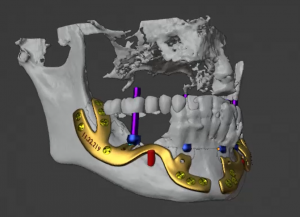Diabetes is a chronic disease in which blood sugar (glucose) levels are elevated resulting in relative or absolute insulin deficiency. Recent research by the International Diabetes Federation (IDF) shows that more than 400 million people in the world suffer from diabetes and it is one of the most deadly diseases today. November 14 has been declared World Diabetes Day to raise awareness of the health threat posed by undetected or poorly regulated diabetes.
How do we connect diabetes with dentistry and oral health?
Patients who do not control the disease can have major oral health problems. Diabetes reduces the body’s resistance to fighting infections by slowing down the production of leukocytes, which are responsible for the body’s first response to infection. Furthermore, dry mouth syndrome is possible because diabetes reduces salivation, which can lead to various infections, pain and caries. In surgical procedures, diabetes can significantly impede the patient’s recovery because it slows down blood circulation, and thus the healing of the mucosa.
When we associate diabetes with dentistry, the most important thing is to mention periodontitis – an inflammatory disease of the supporting tissues of the teeth caused by microorganisms that leads to the destruction of the periodontium (the retaining system of the teeth).
Diabetes and periodontitis
Diabetes and periodontitis are chronic diseases that are becoming more common. Research shows that as many as 46% of people over the age of 37 have some form of periodontitis, and 10% of people have a severe form that significantly reduces their quality of life. There are strong links between these two diseases, moreover, people with periodontitis are more likely to develop diabetes and vice versa, people with diabetes are three times more likely to develop periodontal disease.
Furthermore, controlling periodontitis is much more difficult in people with diabetes, and patients with both have a higher risk of serious medical complications such as cardiovascular disease, kidney disease, stroke etc.
How to recognize the symptoms of diabetes:
- sudden weight loss
- frequent urination
- increased hunger
- thirst and dry mouth
- slow wound healing
- bad breath
- fatigue and exhaustion
- blurred vision
How to recognize the symptoms of periodontitis:
- bleeding gums when brushing teeth
- inflamed gums
- bad breath
- tooth mobility
- if you have prosthetic works in your mouth (bridges, dentures), and you notice that they no longer sit as well as before because there was mobility
Prevention
To prevent these two diseases, perform regular check-ups.
If you already have diabetes, visit a diabetologist regularly and take therapy. Proper nutrition and increased physical activity are of utmost importance.
For oral health, visit your dentist regularly and let him know you have diabetes. Clean dental plaque twice a year or as directed by your doctor. Take care of the hygiene of the oral cavity, and if you wear a prosthesis, take care to clean it regularly. Smoking cessation is recommended for smokers because diabetics, who are also smokers, have a high risk of periodontitis.
Take care of yourself and your loved ones, read the signs your body sends you and react in time!




